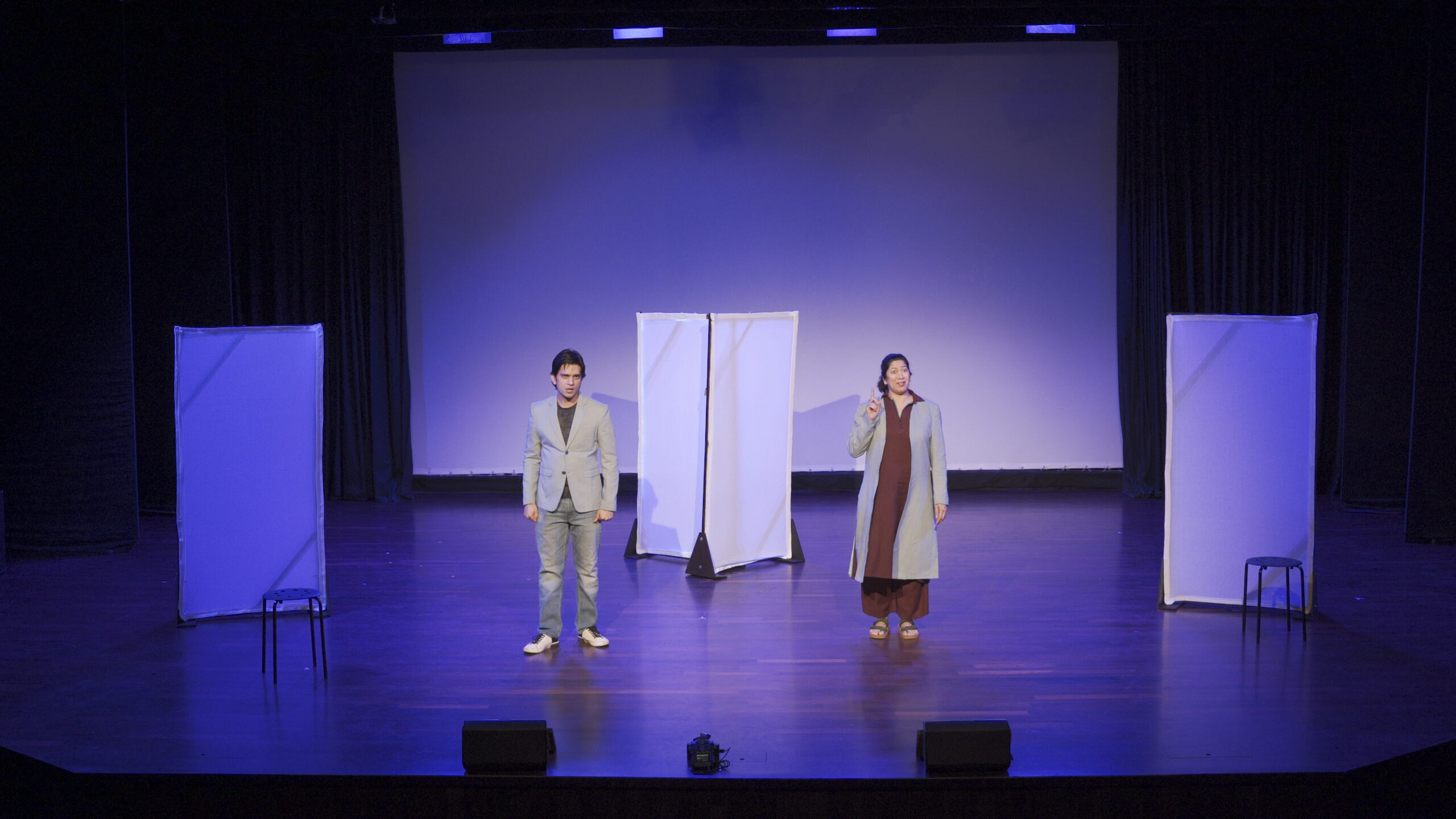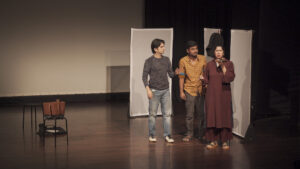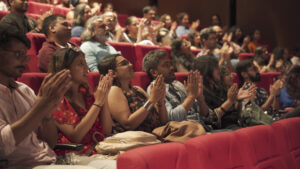Published Oct 21, 2025 | 7:00 AM ⚊ Updated Oct 21, 2025 | 7:00 AM

A scene from 'Fever Dream'.
Synopsis: Tafreehwale is a Mumbai-based theatre company known for creating playful, political, and original work, with acclaimed shows such as ‘Plan B/C/D/E’, ‘I Killed My Mother/It Wasn’t My Fault’, ‘Jungle Nama’, and now, ‘Fever Dream’.
In an age dominated by 20-second reels and minute-long Instagram clips, director Meghana AT, founder Tafreehwale asks a pressing question: Can we really grasp the gravity of climate crisis in a scroll?
In an interview with South First, Meghana discusses her latest play, Fever Dream, on heat stress and climate inequality, the obsession with tech-driven solutions, and why theatre, with its intimacy, emotion, and extended attention span, might just be one of the most powerful tools left to move people from apathy to action.
Excerpts from the interview:
Q: Cool pods is a fictitious product that three innovators are trying to showcase on an equally fictitious tech talent show. Tell us about this play and the focus on climate change.
A: Political theatre is not something new. nor is issue-based theatre. It is integral to what much of theatre around the world, storytelling art, has been about. With climate change, earlier, it was like people weren’t talking about it enough. Now the way people are talking about it is factual.
It’s very dry. It’s happening in that side of the world. There is flooding in Himachal Pradesh, while somewhere else there is drought. It’s somebody else’s problem. But with theatre, when we make it personal, we make it intimate. You see yourself in the characters. Hopefully, we start to see ourselves as implicated in the climate crisis and hopefully, a part of the climate solution as well.
Q: Why is that the entire story is centred on heat stress?
A: Asar Social Impact Advisors came to us. I have had a show previously about climate as well, but it was more about the rising sea levels. And since I’m from Mumbai, I am a bit more worried about the rising sea levels.

A scene from Fever Dream.
Asar approached us and said that we should do a play about heat. The challenge was to make sure that we do feed in facts. We do feed in information because we may think of heat as, ‘oh, this year’s the hottest’ or, ‘it’s hotter than last year’, and ‘the next year is going to be even hotter.’
But what is happening at a meta scale? What is happening to our agricultural systems? What is happening to our electrical load because of more people using air conditioners? What is happening to pollution because more people using air conditioners? How can we incorporate all these into a story that’s just about people like us, people we know, our friends, our colleagues and our heroes and villains? How can we feed those facts into all of that? That was our challenge, and I hope we’ve succeeded in achieving it.
Q: You have used a fictitious tech talent show, but isn’t there an obsession with finding solutions using tech, and gadgets?
Yes. Why are we talking about going to Mars? I don’t get it. We have a planet here. It has everything we need. We have enough resources to feed everybody. There’s no need for people to go hungry. But it’s more flashy to say, ‘I’m going to be the first one to go to Mars!’ And when you have a tech innovation, I think you can get fame from it. You get more money.
So, that’s why the world is going that way. But actually, what will save us is not fancy or tech. It’s us looking out for each other. If we’re not looking out for each other, we’re not going to get anywhere. We’re not going to save ourselves.
Q: Do you suppose there’s an inequality in dealing with heat stress?
A: When we talk about heat, for example, when there is a red alert in Mumbai, there will be government announcements which says, ‘stay out of the heat and stay hydrated.’
How are construction workers supposed to stay out of the heat? How will rickshaw drivers, bus drivers or train drivers or vegetable vendors insulate themselves from heat? They are running our cities. They are not given an off because it is hot. They are expected to continue working so that the city can keep working. And that’s I think that inequality is something we really wanted to bring to the fore.
The audience coming to watch plays, most likely the privileged, the kind who can say, ‘oh, it’s hot today. I’m not going to go outside. I’m going to skip working out. I’m going to, you know, take a cab. I’m going to put on the AC.’
That’s not an actual solution to the climate crisis. That’s not even a band-aid solution. It’s something that’s worsening it. That’s namak (salt) on the wound.
Q: Do you see theatre and art as the new frontiers when you talk about climate activism?
A: I don’t know if it’s the new frontier. It could be. I hope it will be. Speaking of these one-minute clips, what happens is this attention economy we are all in, a hundred billion things are trying. to capture my attention on Instagram or YouTube, and nobody captures it for more than a few seconds.

Theatre gets a captured audience for 60 minutes, who’s going through a story, who’s feeling feelings, who’s travelling this journey.
So, I read something, I’m moved by it, and then I move on. And then I read something, and I move back, and then I move. You know, it’s just an endless cycle.
But with theatre, what we get, hopefully, is a captured audience sitting there for 60 minutes, who’s going through a story, who’s feeling feelings, who’s travelling this journey. The impact of those 60 minutes on you, 60 minutes of sitting with the thought or an idea, will always be more than what a one-minute video can do. More importantly, when we’re trying to make a one-minute video on Instagram or more often than not, a ten and twenty second video, we’re trying to be catchy and we’re trying to be re-shareable, which has its place in society. But that doesn’t allow us to go deep into any matter.
Q: What should the audience take away from this play?
A: I have a very clear idea, but I don’t want to say it because then I don’t want audiences to feel pressured that they have to meet my expectations.
I hope it makes people not only ponder more about the climate crisis, but I want people to think about, ‘What am I doing to actually be a part of the change.’ I don’t think re-sharing posts on Instagram and signing a petition or two is bringing change. I think a lot of us have become a little complacent where we feel like, ‘Oh, but you know, I post about this, I talk about it.’
It’s not enough. We have to be, speaking up to our governments when they are cutting down trees and mangroves and, destroying our lakes and weather in Bengaluru. A few years ago, nobody had air conditioners in Bengaluru. And now the summer is unbearable.
I grew up coming to Bengaluru as a small child and I remember being like, ‘But it’s not summer here, how is it summer in Bombay.’ And now, I don’t want to come here. It is unbearable. It’s unbearable in Mumbai also.
Q: Can tech be the solution to manage climate crisis?
A: It can be a part of the solution and it will be. Technology is a part of our lives. How could it not be a part of the solution!
The most funniest and ridiculous phrase now in this context is the carbon capture plant. Carbon capture plant should be a tree. ‘There is a tree, make more trees.’ But no, we will make carbon capture plants. So tech of course will be a part of the solution. Tech can’t be the only solution.
Q: What might happen when heat stress denies enough water for all?
A: I’m trying not to be cynical and un-optimistic, but I’m more cynical than I would like to be.
Q: What will happen when the taps finally run dry?
A: I hope that we stand up for each other and we remember that we have nothing if we don’t have our shared humanity.
We’re not going to take all the money and the stocks and the crypto beyond the grave with us. So if we can save each other… it’s my hope.
(Edited by Majnu Babu).

